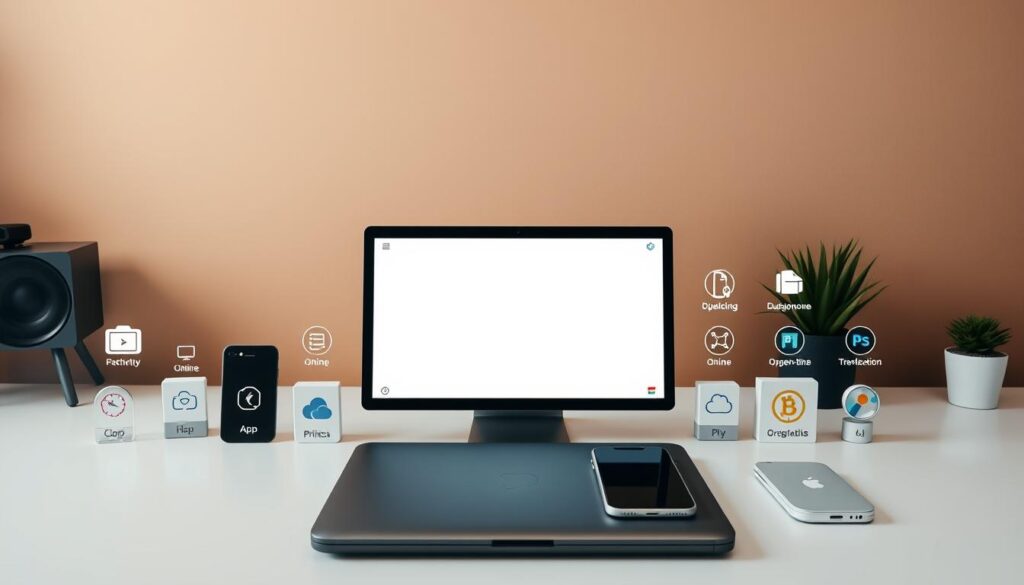Starting your journey in the digital age can feel overwhelming. Yet, it’s a path that leads to new chances and connections. As technology changes our lives, knowing the digital world is key.
Digital literacy is now a must-have skill. It lets people confidently explore the digital world. This opens doors to knowledge, education, and worldwide networks.
Entering this new era, a strong start is vital. This guide aims to help beginners begin their digital journey. It’s designed to help you make the most of what the digital world offers.
Key Takeaways
- Understanding digital literacy is essential in today’s digital age.
- Navigating the digital world can open doors to new opportunities.
- Digital literacy empowers individuals to access information and education.
- Starting with a solid foundation is key to making the most of the digital world.
- Embracing technology can enhance daily life and global connections.
The Complete Beginner In Digital Age: Your Journey Starts Here
Starting in the digital world can feel daunting, but it’s a journey worth taking. The first step is to build confidence and set goals you can reach.
Overcoming Digital Anxiety and Building Confidence
Digital anxiety is common for beginners. But, you can overcome it by slowly getting used to digital tools and learning spaces. Start with simple tasks and then move on to more complex ones to build your confidence.
Tips for Building Confidence:
- Start with basic digital tools and gradually move to more complex ones.
- Practice regularly to reinforce learning.
- Join online communities or forums for support.
Setting Achievable Learning Goals
Setting clear, achievable goals is key for beginners in online learning. It keeps you focused and lets you track your progress.
| Skill | Goal | Timeline |
|---|---|---|
| Basic Computer Skills | Understand basic hardware and software | 2 weeks |
| Online Safety | Learn to create strong passwords and avoid scams | 1 week |
| Digital Communication | Master email and messaging apps | 3 weeks |
By focusing on beginner-friendly digital skills and using digital tools for beginners, you can set yourself up for success in the digital age.
Technology Basics for Beginners: Essential Devices
In today’s world, knowing the basics of technology is key. It helps you stay connected and productive. Learning about the devices and tools in the digital world can seem tough at first. But, it’s the first step to becoming digitally savvy.
Smartphones: Your Gateway to the Digital World
Smartphones are more than phones; they’re tiny computers. They let you surf the internet, check emails, and connect with loved ones. Understanding your smartphone’s operating system and exploring apps can enhance your digital life.

Computers and Tablets: Choosing What Works for You
For complex tasks or a bigger screen, computers and tablets are vital. Your choice depends on your needs, like work, mobility, or fun. Knowing the specs of each device is key to making a good choice.
| Device | Best For | Key Features to Consider |
|---|---|---|
| Laptop | Work, mobility | Processor speed, RAM, battery life |
| Desktop | High-performance tasks, gaming | Processor, graphics card, storage |
| Tablet | Entertainment, portability | Screen size, battery life, operating system |
Smart Home Devices: Simplifying Your Life
Smart home devices, like Amazon Alexa and Google Home, change how we live. They control lights, temperature, security, and more with your voice or a tap. Adding smart home devices to your daily life can make things easier, more efficient, and cozy.
“The way to get started is to quit talking and begin doing.” – Walt Disney
Understanding Web Browsers and Search Engines
Knowing how to use web browsers and search engines is essential. Browsers like Google Chrome and Safari let you access the internet. Search engines, like Google, help you find what you need online. Learning to use these tools well can greatly improve your online experience.
- Choose a web browser that fits your needs.
- Learn to use search engines effectively with specific keywords and filters.
- Bookmark important sites for easy access.
By learning the basics of these devices and tools, you’ll become more confident and skilled in the digital world.
Internet Essentials for Beginners: Communication Tools
For beginners, learning about internet communication is key. It’s important for both personal and work life. Knowing how to communicate online is essential.
Email Fundamentals: Setting Up and Managing Your Inbox
Email is a basic tool for online talk. Setting up an email account is your first step online. To keep your inbox tidy, make folders for different emails and use filters.
- Choose a reliable email service provider.
- Use a strong, unique password for your email account.
- Regularly clean out your inbox to stay organized.
Effective email management keeps your digital space neat. It also helps avoid digital mess.
Connecting Through Messaging Apps and Video Calls
Messaging apps and video calls are key for staying in touch. Popular messaging apps like WhatsApp and Facebook Messenger have cool features. They include group chats and file sharing.
- Download and install your chosen messaging app.
- Set up your profile and adjust your privacy settings.
- Explore the app’s features, such as voice and video calls.
Video conferencing tools like Zoom and Skype are common for meetings. Learning these tools improves your online chats.
Social Media Basics: Staying Connected Responsibly
Social media helps us connect and share. But, it’s important to use it wisely. Understanding privacy settings and sharing wisely are key.
“The way we communicate online is changing the way we interact in the real world. It’s essential to be aware of our digital footprint.” – Anonymous
To stay connected wisely, remember these tips:
- Be careful about what you share online.
- Use privacy settings to control who sees your stuff.
- Interact kindly with others’ posts and avoid bullying.
Staying Safe in the Digital World
As we explore the internet, keeping safe online is key. The digital world offers many chances, but it also has risks. We must handle these risks well.
Creating and Managing Strong Passwords
Securing your online space starts with strong, unique passwords. A good password mixes letters, numbers, and symbols. Don’t use your name, birthdate, or common words. Using a password manager can help generate and store complex passwords securely.
For extra security, turn on two-factor authentication (2FA) when you can. This requires a second verification, like a code to your phone or a biometric scan.
Recognizing and Avoiding Online Scams
Online scams come in many forms, like phishing emails and fake websites. Knowing how to spot these threats is key. Always check if emails and messages are real before sharing personal or financial info. Watch for misspellings, generic greetings, and suspicious links or attachments.
Make sure websites are secure before sharing sensitive info. Look for “https” in the URL and a padlock icon in the address bar. Never share sensitive info on unsecured sites.
Protecting Your Personal Information Online
Keeping your personal info safe is critical in today’s digital world. Be careful about what you share on social media and online. Share less personal data to lower the risk of identity theft and scams.
“The most important thing in communication is hearing what isn’t said.” – Albert Einstein
This quote shows the importance of being careful with what you share online. It can have big consequences.
Check your privacy settings on social media and online services often. This helps control who sees your info. Stay up-to-date with data protection tips and adjust your online habits.
Digital Tools for Beginners: Managing Your Digital Life
For those new to the digital world, it’s important to learn about digital tools. These tools help you stay organized and safe online. With so many options, it can feel overwhelming. But, the right tools can make your digital life easier.
Cloud Storage: Your Digital Safety Net
Cloud storage is essential for anyone online today. It lets you save files online, so you can access them from any device. This keeps your important documents safe and makes sharing easy.
Popular Cloud Storage Services:
- Google Drive
- Dropbox
- OneDrive
These services offer free storage, with options to pay for more. Think about how you’ll use it. For example, Google Drive is great if you use Google services a lot.

Digital Organization Techniques for Everyday Use
Being organized online is more than just cloud storage. It’s about using practices that help you manage your digital life well.
Effective Digital Organization Techniques:
| Technique | Description | Benefit |
|---|---|---|
| Folder Organization | Create clear, hierarchical folder structures in your cloud storage. | Easily locate files and reduce clutter. |
| File Naming Conventions | Use consistent, descriptive file names. | Improve searchability and reduce confusion. |
| Task Management Tools | Utilize digital tools like Trello or Asana for task management. | Enhance productivity and keep track of projects. |
Using these techniques can boost your productivity and cut down on digital clutter.
As you explore the digital world, remember it’s not just about using new tools. It’s about using them well. Mastering cloud storage and organization will help you manage your digital life confidently.
Online Shopping and Digital Payments Made Simple
Getting used to online shopping and digital payments is key in today’s world. Technology keeps getting better, changing how we shop and watch media.
Safe Shopping Practices for Beginners
When you start online shopping, safety is most important. Make sure websites are secure by checking for “https” and a padlock icon. Use strong, unique passwords for all accounts.
It’s also good to know about return and refund policies. This can help avoid problems if you need to return or exchange items.
Understanding Different Digital Payment Methods
Today, there are many ways to pay online. Credit and debit cards are common, but digital wallets like Apple Pay offer extra security. They don’t share your real card details.
Bank transfers and online banking payments are also popular. They let you pay directly from your bank account. Knowing the fees, security, and ease of each method helps you pick the best one.
| Payment Method | Security Features | Convenience Level |
|---|---|---|
| Credit/Debit Cards | CVV, Fraud Protection | High |
| Digital Wallets | Tokenization, Biometric Auth | Very High |
| Bank Transfers | Secure Banking Networks | Medium |
Exploring Streaming Services and Digital Media
Streaming services have changed how we enjoy entertainment and learn. Netflix, Hulu, and Amazon Prime have lots of movies, TV shows, and original content.
Music streaming services like Spotify and Apple Music give you access to millions of songs. Knowing what each service offers and how much it costs helps you find the right one for you.
Discovering Podcasts, E-books, and Online Games
The digital world is full of podcasts, e-books, and online games. Podcasts cover many topics, from news to entertainment.
E-books are a great way to read books and learn digitally. Online games offer fun and can help you meet people and learn new things.
- Podcasts: Explore topics like news, storytelling, and educational content.
- E-books: Access a vast library of literature and educational materials.
- Online Games: Engage in entertainment and social interaction.
Online Learning for Beginners: Resources and Opportunities
Starting online learning can be both thrilling and scary for beginners. There are so many resources out there, it’s hard to know where to begin. But with the right help, anyone can explore online learning and reach their goals.
Free Educational Resources to Start Your Learning Journey
The internet is packed with free educational resources for beginners. Sites like Coursera, edX, and Khan Academy have lots of courses on different topics. These platforms are great for trying out new subjects and finding what interests you.
As Salman Khan, founder of Khan Academy, once said, “The most important thing is to never stop learning.” This idea is key in online learning. It encourages people to keep learning new things.
“The most important thing is to never stop learning.” – Salman Khan
Finding the Right Online Courses and Tutorials
Finding the right online course or tutorial can feel overwhelming. To make it easier, beginners should first think about what they want to learn. Do they want to get better at digital skills, learn a new language, or master a specific skill? Once they know what they want, they can look for courses on Udemy, Skillshare, or LinkedIn Learning.
Beginner-Friendly Digital Skills to Develop First
For those new to the digital world, it’s key to start with beginner-friendly digital skills. Skills like basic computer knowledge, online safety, and social media use are essential. Also, learning about digital tools like Google Workspace or Microsoft Office can really boost your productivity.
- Basic computer literacy
- Online safety and security
- Social media management
- Digital tool proficiency (e.g., Google Workspace, Microsoft Office)
By focusing on these skills and using the many online resources out there, beginners can set themselves up for success in their digital journey.
Digital Citizenship and Wellness
The digital age brings a new awareness: digital citizenship and wellness. As we use digital tech more, it’s key to know how to use it right.
Practicing Good Digital Etiquette
Good digital etiquette means being kind and thoughtful online. It’s about sharing wisely, not bullying, and keeping others’ privacy safe.
- Be careful with what you post online.
- Don’t engage in or stand by cyberbullying.
- Respect others’ digital rights and privacy.
By being polite online, we help make the internet a better place.
Managing Screen Time Effectively
It’s important to control our screen time for digital wellness. Too much screen time can make us tired and harm our health.
| Strategy | Description | Benefit |
|---|---|---|
| Set Screen Time Limits | Set daily limits on screen time. | Reduces digital fatigue. |
| Schedule Digital Breaks | Plan regular breaks from digital devices. | Improves mental health. |
| Prioritize Offline Activities | Do things that don’t involve screens. | Boosts physical health. |
Preventing Digital Burnout and Maintaining Balance
To avoid digital burnout, we need to balance our digital and real lives. It’s about knowing our digital habits and choosing wisely.
By focusing on digital citizenship and wellness, we can enjoy the digital world while keeping our well-being safe.
Empowering Your Future in the Digital Age
Starting as a complete beginner in the digital age is just the beginning. With the right mindset and tools, you can confidently navigate the digital world. Learning digital tools for beginners boosts your skills and opens doors for growth.
It’s important to keep learning digital skills to stay up-to-date. You can do this through online courses, learning digital organization, or staying safe online. Each step you take helps you achieve more.
Embracing this journey opens up new opportunities and improves your digital skills. You’ll also keep your digital life healthy. The digital world is full of possibilities, and you’re ready to explore them. Take charge of your digital future and discover all it has to offer.







